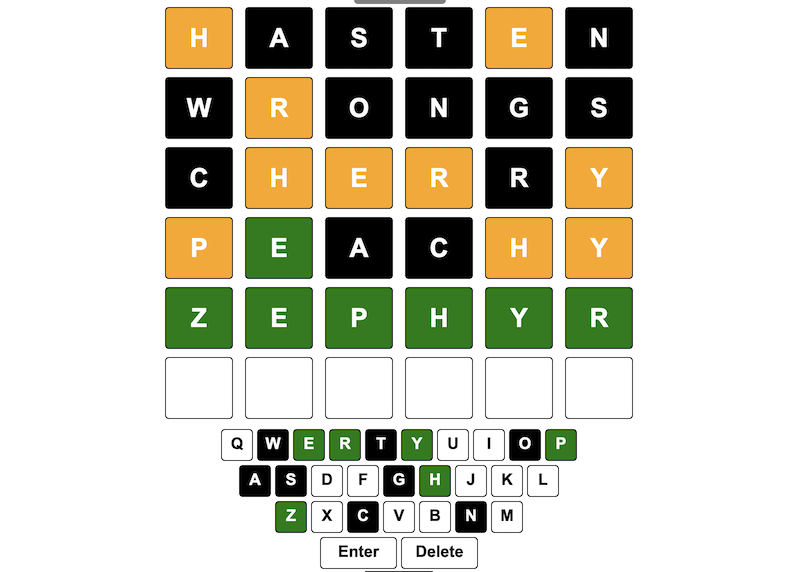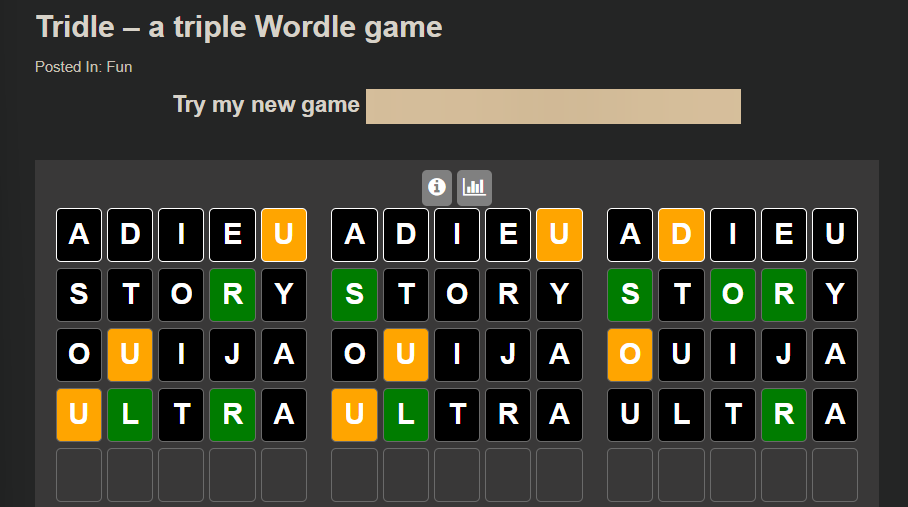
Triquordle word games have always held a unique charm, combining entertainment with intellectual challenge. Among the many puzzle variations that have emerged in recent years, triquordle has captured the attention of enthusiasts who crave more than a single word challenge. Unlike traditional word games, it requires players to solve three different five-letter words at the same time, making it a perfect blend of strategy, vocabulary, and critical thinking. This guide explores its rules, strategies, and appeal in detail, providing everything you need to know to become a master of the game.
What is Triquordle?
Triquordle is a spin-off of the famous Wordle puzzle that went viral across the globe. The core mechanics remain the same—guessing five-letter words using hints from colored tiles—but with a twist: you must solve three grids simultaneously. Every word guess you make applies to all three grids, requiring players to think ahead and balance their approach.
This format pushes players beyond the comfort zone of single-word deduction, testing not just vocabulary but also adaptability. While the concept may sound overwhelming at first, it offers a deeply satisfying challenge for anyone who enjoys word puzzles.
How to Play Triquordle
To enjoy Triquordle, players must first understand its mechanics.
-
Starting the Game – You begin with three blank grids, each hiding a unique five-letter word.
-
Making Guesses – Each guess is entered across all grids simultaneously.
-
Interpreting Clues – Tiles turn green when a letter is correct and in the right position, yellow when a letter is correct but misplaced, and gray if a letter is absent.
-
Balancing Strategy – Since each guess affects all three puzzles, strategic word selection is crucial.
-
Winning or Losing – The challenge is to solve all three words within the given attempts, usually nine guesses.
The mechanics may appear simple, but the challenge escalates as players juggle different patterns across multiple boards.
Why Triquordle Stands Out Among Word Games
Many puzzle games follow repetitive structures, but Triquordle differentiates itself by offering simultaneous problem-solving. This feature makes it stand out for several reasons:
-
Complexity with Clarity – Unlike chaotic puzzle mashups, Triquordle maintains the elegance of Wordle while introducing layered complexity.
-
Engagement Factor – Solving three puzzles at once keeps players engaged for longer periods.
-
Skill Development – It sharpens vocabulary, improves spelling, and enhances logical reasoning.
-
Replay Value – With daily puzzles and random modes, it ensures fresh challenges each time.
The game is not just an entertainment activity but also a brain-training exercise that appeals to both casual and competitive players.

Strategies to Excel at Triquordle
Winning consistently in Triquordle requires strategy rather than random guessing. Below are proven techniques:
1. Start With Strong Opener Words
Begin with words that include a mix of common vowels and consonants such as “table,” “crane,” or “spoil.” These help reveal useful letter placements across multiple boards.
2. Track Each Grid Separately
It’s easy to get overwhelmed. Keep mental or written notes for each grid to avoid mixing up clues.
3. Balance Exploration and Precision
Don’t fixate on one board. Instead, alternate between narrowing down letters across all three puzzles.
4. Use Elimination Wisely
Every incorrect guess narrows possibilities. Intentionally test letters that haven’t appeared to gain maximum information.
5. Control the Pace
Rushing often leads to wasted guesses. Analyze each result carefully before committing to the next word.
The Learning Curve of Triquordle
For beginners, Triquordle may seem intimidating compared to single-word puzzles. However, the learning curve becomes manageable with practice. New players often experience a transition from random guessing to deliberate strategy after several rounds. The more you play, the quicker your brain adapts to handling multiple boards simultaneously.
The game rewards persistence, making small victories feel monumental and complete wins highly rewarding.
The Psychological Appeal of Triquordle
Why has Triquordle become such a phenomenon? The answer lies in psychology. Humans love challenges that feel just within reach but not too easy. The game triggers both the dopamine rush of small wins and the drive for mastery.
Furthermore, its time-limited structure ensures players don’t get trapped for hours, unlike other endless puzzles. This balance of effort and satisfaction explains its addictive charm.
Triquordle vs Other Multi-Word Games
The popularity of Wordle inspired several spin-offs. Quordle requires solving four words, while Octordle escalates to eight. Compared to these, Triquordle strikes a perfect balance.
-
Easier than Quordle or Octordle but harder than Wordle.
-
Ideal for players transitioning from single puzzles to multi-board challenges.
-
Offers both accessibility and depth.
This makes it suitable for both casual players and serious puzzle enthusiasts.
Educational Benefits of Playing Triquordle
Beyond entertainment, Triquordle offers cognitive benefits:
-
Vocabulary Expansion – Exposure to rare five-letter words enhances language skills.
-
Pattern Recognition – Players learn to detect letter arrangements more quickly.
-
Memory Training – Tracking clues across three grids improves working memory.
-
Problem-Solving – Strategic deduction strengthens critical thinking abilities.
For students, educators, and lifelong learners, it doubles as both a study tool and leisure activity.

Common Mistakes Beginners Make
-
Focusing only on one grid instead of balancing attention across all three.
-
Overusing random guesses without a clear elimination plan.
-
Forgetting previously tested letters, which wastes opportunities.
-
Panicking under pressure, leading to rushed, inaccurate guesses.
Avoiding these errors can significantly improve your chances of success.
The Future of Triquordle and Word Games
The rise of Triquordle reflects the broader evolution of digital puzzles. As technology and gaming trends advance, we can expect:
-
More Variations – Developers will experiment with new difficulty levels.
-
Integration with Social Play – Sharing results and competing with friends may expand.
-
Educational Applications – Schools may adopt word puzzles like Triquodle for language learning.
-
Global Growth – With translations and accessibility improvements, the game may reach even wider audiences.
The game is more than a fad—it represents the future of interactive learning and entertainment.
Conclusion
In a digital age filled with endless distractions, Triquordle stands as a refreshing mix of fun and intellectual engagement. Its three-board challenge pushes players to think strategically, expand their vocabulary, and enjoy meaningful gameplay. Whether you’re a seasoned Wordle fan or a newcomer to puzzles, mastering Triquorde offers a rewarding journey. The best way to excel is through consistent practice, smart strategies, and a love for problem-solving. With dedication, anyone can become a Triquorde expert.
FAQs
1. What makes Triquordle different from Wordle?
It requires solving three words simultaneously using the same guesses, making it more complex.
2. How many guesses do players get in Triquordle?
Usually, players receive nine attempts to solve all three puzzles.
3. Can Triquordle improve vocabulary?
Yes, it introduces rare words and sharpens spelling skills, making it educational as well as fun.
4. Is Triquordle suitable for beginners?
Yes, but it requires patience. It is a step up from Wordle but easier than Quordle or Octordle.
5. Why is Triquordle addictive?
It provides the right balance of difficulty and reward, triggering motivation to improve daily.
Read Also: Top Reasons Why b01lwq8xa9 Stands Out in Bluetooth Headphones






